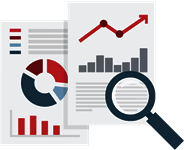 The analysis and interpretation of data play a fundamental role in unlocking the secrets of our planet's complex geological history. Geologists rely heavily on robust data analysis to make sense of vast datasets collected from various geological surveys, fieldwork, and laboratory experiments. These analyses not only form the foundation of groundbreaking discoveries but also provide critical insights into Earth's evolution, natural resource exploration, and environmental management. At Data Analysis Help.net, we understand the paramount importance of accurate and insightful data analysis. With a dedicated team of experienced geologists and data scientists, we can offer the best geological science research data visualization help to support your scientific investigations. Whether you are studying plate tectonics, mineralogy, paleontology, or any other geological discipline, our expertise is tailored to meet your specific research needs. Our commitment to excellence in geology research data analysis begins with our team of experts. Our geologists have extensive knowledge of geological processes, coupled with a deep understanding of data analysis techniques. They are equipped with state-of-the-art tools and software to process, clean, and analyze geological datasets, ensuring the utmost accuracy and reliability of results. What sets us apart is our unwavering dedication to not only analyzing data but also interpreting it in a meaningful and scientifically significant manner. We go beyond mere statistical analyses to uncover hidden patterns, relationships, and trends within your geological data. This is where the true value of our services lies, in transforming raw data into actionable insights that can inform your research conclusions, hypotheses, and future directions. Furthermore, our services are customizable to accommodate projects of all sizes and complexities. Whether you are a graduate student embarking on your first research endeavor or a seasoned geologist leading a comprehensive exploration project, we have the expertise to support you every step of the way. Our commitment to precision, quality, and timely delivery ensures that your research remains on schedule and budget. Data analysis and interpretation are indispensable components of scientific exploration in the field of geology. We take pride in offering reliable data analytics help for geology academic projects, driven by a passionate team of experts who are dedicated to advancing our understanding of Earth's geological wonders. When you partner with us, you are not just getting data analysis; you are gaining access to a wealth of geological insights that can propel your research to new heights. Together, we can unravel the mysteries of the Earth's past and pave the way for a more sustainable future.
The analysis and interpretation of data play a fundamental role in unlocking the secrets of our planet's complex geological history. Geologists rely heavily on robust data analysis to make sense of vast datasets collected from various geological surveys, fieldwork, and laboratory experiments. These analyses not only form the foundation of groundbreaking discoveries but also provide critical insights into Earth's evolution, natural resource exploration, and environmental management. At Data Analysis Help.net, we understand the paramount importance of accurate and insightful data analysis. With a dedicated team of experienced geologists and data scientists, we can offer the best geological science research data visualization help to support your scientific investigations. Whether you are studying plate tectonics, mineralogy, paleontology, or any other geological discipline, our expertise is tailored to meet your specific research needs. Our commitment to excellence in geology research data analysis begins with our team of experts. Our geologists have extensive knowledge of geological processes, coupled with a deep understanding of data analysis techniques. They are equipped with state-of-the-art tools and software to process, clean, and analyze geological datasets, ensuring the utmost accuracy and reliability of results. What sets us apart is our unwavering dedication to not only analyzing data but also interpreting it in a meaningful and scientifically significant manner. We go beyond mere statistical analyses to uncover hidden patterns, relationships, and trends within your geological data. This is where the true value of our services lies, in transforming raw data into actionable insights that can inform your research conclusions, hypotheses, and future directions. Furthermore, our services are customizable to accommodate projects of all sizes and complexities. Whether you are a graduate student embarking on your first research endeavor or a seasoned geologist leading a comprehensive exploration project, we have the expertise to support you every step of the way. Our commitment to precision, quality, and timely delivery ensures that your research remains on schedule and budget. Data analysis and interpretation are indispensable components of scientific exploration in the field of geology. We take pride in offering reliable data analytics help for geology academic projects, driven by a passionate team of experts who are dedicated to advancing our understanding of Earth's geological wonders. When you partner with us, you are not just getting data analysis; you are gaining access to a wealth of geological insights that can propel your research to new heights. Together, we can unravel the mysteries of the Earth's past and pave the way for a more sustainable future.
How Should Students Collect Data for Their Geology Projects?
Collecting data for geology projects is essential for understanding and analyzing geological phenomena. Here are some steps students can follow to effectively collect data for their geology projects:
- Define the Research Question: Start by clearly defining the research question or objective of your project. What specific aspect of geology are you investigating? Having a well-defined question will guide your data collection efforts.
- Write a Literature Review: Conduct a literature review to gather background information and learn about previous studies related to your topic. This will help you understand existing knowledge and inform your data collection methods.
- Select Data Collection Methods: Choose appropriate data collection methods based on your research question. Common methods in geology include field observations, geological mapping, remote sensing, laboratory analysis of rock samples, and geophysical surveys.
- Plan Fieldwork: If your project involves fieldwork, plan it carefully. Identify study locations, obtain necessary permits, and assemble the required equipment and safety gear. Create a fieldwork schedule and consider logistical factors like transportation and accommodations.
- Do Geological Mapping: Create geological maps of your study area, noting the distribution of different rock units, faults, and other geological features. Accurate mapping is crucial for understanding the geological context.
- Do Sample Collection: If applicable, collect rock and soil samples for laboratory analysis. Ensure proper labeling and documentation of sample locations. Follow safety guidelines when handling samples.
- Conduct Data Recording and Organization: Maintain organized records of all collected data, including field notes, photographs, maps, and lab results. This will facilitate data analysis and reporting.
- Do Data Validation: Cross-check your data for accuracy and consistency. Collaborate with mentors, professors, or peers to review your findings and ensure data quality.
- Analyze Data: Analyze your collected data using appropriate geological techniques and tools. Interpret your findings in the context of your research question.
What's the Process of Analyzing Data in a Geology Paper?
Analyzing data typically involves several key steps. Researchers must carefully read and understand the paper, including its objectives, methodology, and findings. They should identify the primary data sources, such as geological samples, maps, or datasets, and gather this information. Also, data preprocessing is essential, which may involve cleaning and organizing raw data, ensuring consistency, and addressing missing or erroneous values. Once the data is prepared, researchers employ various statistical and analytical techniques to extract meaningful insights. This can include statistical tests to assess the significance of findings, visualization tools like graphs and maps to illustrate patterns and trends, and geospatial analysis to examine spatial relationships. Geologists often use specialized software and programming languages like GIS and Python to facilitate these analyses. Interpreting the results is a critical step, where researchers draw conclusions based on their data analysis. They should consider how their findings contribute to existing geological knowledge and address the research questions or hypotheses posed in the paper. It's essential to critically evaluate the quality and reliability of the data, as well as any potential biases or limitations in the study. Moreover, researchers should communicate their findings through presentations, reports, or publications, adhering to the scientific standards and conventions of the field. Peer review and collaboration with other geologists play a vital role in validating and refining the analysis and ensuring the research contributes to our understanding of geological processes and phenomena. To ensure a smooth process, seeking geology research project data analysis help is a suitable step to take.
 Through the diligent collection, organization, and examination of geological data, researchers can uncover valuable insights into the Earth's history, and its current state, and even predict future geological events. This concluding statement underscores the importance of meticulous data analysis and interpretation in geology projects. Throughout this exploration, we have delved into the various stages involved in data analysis and interpretation, including data collection, data cleaning, data visualization, and statistical analysis. These processes are essential for transforming raw geological data into meaningful information that can be used to address research questions and hypotheses. The application of geospatial tools and data analysis methods for geoscience research papers has further enriched our ability to analyze and interpret geological data with precision and accuracy. Moreover, the significance of data interpretation cannot be overstated. It is the phase where researchers draw meaningful conclusions, make inferences, and develop hypotheses based on the analyzed data. It is through data interpretation that geologists can make predictions about geological phenomena, assess environmental impacts, and contribute to our knowledge of Earth's dynamic processes. Geology projects heavily rely on robust data analysis and interpretation to uncover the Earth's geological secrets. These processes equip scientists with the tools to uncover patterns, make informed predictions, and advance our knowledge of the Earth's past, present, and future. As technology continues to evolve, so too does our ability to analyze and interpret geological data, promising even more exciting discoveries and breakthroughs in the field of geology. Therefore, the diligent pursuit of data analysis and interpretation remains an essential endeavor for geologists, offering the potential for greater insights into the Earth's geological mysteries.
Through the diligent collection, organization, and examination of geological data, researchers can uncover valuable insights into the Earth's history, and its current state, and even predict future geological events. This concluding statement underscores the importance of meticulous data analysis and interpretation in geology projects. Throughout this exploration, we have delved into the various stages involved in data analysis and interpretation, including data collection, data cleaning, data visualization, and statistical analysis. These processes are essential for transforming raw geological data into meaningful information that can be used to address research questions and hypotheses. The application of geospatial tools and data analysis methods for geoscience research papers has further enriched our ability to analyze and interpret geological data with precision and accuracy. Moreover, the significance of data interpretation cannot be overstated. It is the phase where researchers draw meaningful conclusions, make inferences, and develop hypotheses based on the analyzed data. It is through data interpretation that geologists can make predictions about geological phenomena, assess environmental impacts, and contribute to our knowledge of Earth's dynamic processes. Geology projects heavily rely on robust data analysis and interpretation to uncover the Earth's geological secrets. These processes equip scientists with the tools to uncover patterns, make informed predictions, and advance our knowledge of the Earth's past, present, and future. As technology continues to evolve, so too does our ability to analyze and interpret geological data, promising even more exciting discoveries and breakthroughs in the field of geology. Therefore, the diligent pursuit of data analysis and interpretation remains an essential endeavor for geologists, offering the potential for greater insights into the Earth's geological mysteries.
Pay Someone to Analyze Data in a Geology Academic Paper
 In the ever-evolving field of geology, the acquisition and analysis of data help in advancing our understanding of Earth's complex geological processes. Geology papers are not just scholarly works; they are vital contributions to the collective knowledge that guides environmental policies, resource management, and even disaster mitigation efforts. As geologists strive to unravel the mysteries of our planet's history and predict future geological events, the importance of precise data analysis cannot be overstated. Geological research involves the collection of vast datasets, ranging from rock samples and seismic readings to satellite imagery and GIS data. Interpreting and extracting meaningful insights from these datasets demands a specialized skill set, often beyond the expertise of the research team. This is where we intervene to provide the best geological concepts project data insights. Our data analysts are highly trained professionals with a deep understanding of geospatial data, statistical methods, and geological concepts. Their expertise extends to using advanced software and tools to process, visualize, and interpret complex geological datasets. They are the unsung heroes behind many groundbreaking discoveries in the field, ensuring that research findings are not only accurate but also accessible to a broader audience. The decision to pay for expert services is driven by the recognition that data analysis is a specialized field requiring dedicated resources. We work collaboratively with geologists and researchers, bridging the gap between raw data and meaningful conclusions. Their role is not limited to number crunching; it involves transforming data into actionable insights that drive scientific progress. The importance of analysts in geology research, exploring their skills, contributions, and the benefits they bring to the academic community and society at large. We will also highlight the key considerations when entrusting data analysis to our experts and how their involvement can elevate the quality and impact of geology papers. If you need to pay for earth history project data evaluation, we are the best choice for experts.
In the ever-evolving field of geology, the acquisition and analysis of data help in advancing our understanding of Earth's complex geological processes. Geology papers are not just scholarly works; they are vital contributions to the collective knowledge that guides environmental policies, resource management, and even disaster mitigation efforts. As geologists strive to unravel the mysteries of our planet's history and predict future geological events, the importance of precise data analysis cannot be overstated. Geological research involves the collection of vast datasets, ranging from rock samples and seismic readings to satellite imagery and GIS data. Interpreting and extracting meaningful insights from these datasets demands a specialized skill set, often beyond the expertise of the research team. This is where we intervene to provide the best geological concepts project data insights. Our data analysts are highly trained professionals with a deep understanding of geospatial data, statistical methods, and geological concepts. Their expertise extends to using advanced software and tools to process, visualize, and interpret complex geological datasets. They are the unsung heroes behind many groundbreaking discoveries in the field, ensuring that research findings are not only accurate but also accessible to a broader audience. The decision to pay for expert services is driven by the recognition that data analysis is a specialized field requiring dedicated resources. We work collaboratively with geologists and researchers, bridging the gap between raw data and meaningful conclusions. Their role is not limited to number crunching; it involves transforming data into actionable insights that drive scientific progress. The importance of analysts in geology research, exploring their skills, contributions, and the benefits they bring to the academic community and society at large. We will also highlight the key considerations when entrusting data analysis to our experts and how their involvement can elevate the quality and impact of geology papers. If you need to pay for earth history project data evaluation, we are the best choice for experts.
Can students face challenges when analyzing data? Explain
Yes, students can face various challenges when analyzing data. Data analysis is a critical skill in today's data-driven world, but it can be a complex and daunting task for many students. Students may encounter challenges with;
- Data Collection: One of the initial challenges is gathering relevant data. Students may struggle to find high-quality, comprehensive, and up-to-date data sources for their analysis. In some cases, they might need to deal with messy or incomplete datasets, which can complicate the analysis process.
- Data Cleaning: Raw data requires extensive cleaning and preprocessing. Students may encounter missing values, outliers, or inconsistencies that need to be addressed before analysis can begin. This step can be time-consuming and frustrating, especially for those new to data analysis.
- Statistical Concepts: Understanding statistical concepts and techniques is fundamental to data analysis. Students may find it challenging to grasp concepts like hypothesis testing, regression analysis, or probability theory, which are essential for drawing meaningful conclusions from data.
- Software Proficiency: Many data analysis tasks are performed using specialized software such as Python, R, or statistical packages like SPSS. Learning how to use these tools effectively can be a barrier, especially for beginners.
- Data Interpretation: Analyzing data is not just about running statistical tests; it's about interpreting the results in a meaningful way. Students may struggle with the interpretation of complex statistical outputs and relating them to real-world insights.
- Domain Knowledge: Depending on the analysis task, students may need domain-specific knowledge. For instance, analyzing medical data requires a strong understanding of medical concepts, which can be a hurdle for non-experts.
- Time Management: Data analysis projects can be time-consuming, and students may struggle to manage their time effectively. Balancing data collection, cleaning, analysis, and report writing can be challenging, especially when working on tight deadlines.
- Communication Skills: Effectively communicating the results of data analysis is crucial. Students may find it challenging to convey their findings clearly and concisely through written reports or oral presentations.
- Overcoming Bias: Data analysis can be susceptible to biases, both conscious and unconscious. Students must learn to recognize and address bias in their data and analysis methods.
The importance of analyzing data in a geology project
Analyzing data is paramount in any geology project as it serves as the foundational pillar upon which scientific understanding and informed decision-making rest. Geologists rely on data to unravel the Earth's complex history, processes, and resources. Through the careful examination of geological data such as rock samples, seismic readings, and satellite imagery, researchers can decipher the Earth's past climates, tectonic movements, and environmental changes. This historical context is invaluable for predicting geological hazards like earthquakes and volcanic eruptions, which can have significant societal impacts. Additionally, data analysis allows geologists to locate and assess valuable mineral and energy resources critical to our modern society. In the era of climate change, the study of geological data is instrumental in understanding the Earth's past climate variations, thus enabling us to make informed decisions regarding future environmental conservation and sustainable resource management. Furthermore, geology projects involve multidisciplinary collaboration, and data analysis serves as a common language that bridges the gap between geological research and other scientific disciplines, ensuring a holistic approach to solving complex geological challenges. Relevantly, the importance of analyzing data in projects cannot be overlooked, as it not only advances our understanding of Earth's history but also aids in mitigating geological hazards, managing resources, and addressing contemporary environmental issues. You should pay someone to analyze data in a geology academic paper, to ensure a smooth operation.
 Geology, as a field of study, relies heavily on meticulous data collection, analysis, and interpretation. However, not all geologists possess the specialized skills or resources necessary to conduct complex data analysis effectively. Hiring our professional data analysts ensures the accuracy and reliability of the results. Geology research involves intricate geological phenomena that require advanced statistical techniques and software tools for thorough examination. An experienced data analyst possesses the expertise to handle these complexities, minimizing the risk of errors and misinterpretations in the findings. Additionally, time constraints are a common challenge in academia. By delegating data analysis to a specialist, researchers can save valuable time, allowing them to focus on other critical aspects of their study, such as fieldwork, literature review, and writing. This efficiency can lead to more robust research outcomes and potentially faster publication. Moreover, collaboration between geologists and data analysts fosters interdisciplinary teamwork, enriching the research process. Geologists can gain new insights and perspectives from experts in data analysis, leading to more comprehensive and insightful research. In the contemporary academic landscape, where multidisciplinary research and technological advancements are prevalent, seeking secure geology paper data analysis support is a sensible strategy. However, it is essential to ensure ethical and transparent collaboration, acknowledging the contributions of all team members and adhering to academic integrity standards. Paying for data analysis is a practical and necessary solution to enhance the quality and depth of research in this field. Geologists can utilize specialized expertise, save time, and strengthen the validity of their findings, ultimately advancing the knowledge and understanding of geological processes.
Geology, as a field of study, relies heavily on meticulous data collection, analysis, and interpretation. However, not all geologists possess the specialized skills or resources necessary to conduct complex data analysis effectively. Hiring our professional data analysts ensures the accuracy and reliability of the results. Geology research involves intricate geological phenomena that require advanced statistical techniques and software tools for thorough examination. An experienced data analyst possesses the expertise to handle these complexities, minimizing the risk of errors and misinterpretations in the findings. Additionally, time constraints are a common challenge in academia. By delegating data analysis to a specialist, researchers can save valuable time, allowing them to focus on other critical aspects of their study, such as fieldwork, literature review, and writing. This efficiency can lead to more robust research outcomes and potentially faster publication. Moreover, collaboration between geologists and data analysts fosters interdisciplinary teamwork, enriching the research process. Geologists can gain new insights and perspectives from experts in data analysis, leading to more comprehensive and insightful research. In the contemporary academic landscape, where multidisciplinary research and technological advancements are prevalent, seeking secure geology paper data analysis support is a sensible strategy. However, it is essential to ensure ethical and transparent collaboration, acknowledging the contributions of all team members and adhering to academic integrity standards. Paying for data analysis is a practical and necessary solution to enhance the quality and depth of research in this field. Geologists can utilize specialized expertise, save time, and strengthen the validity of their findings, ultimately advancing the knowledge and understanding of geological processes.


 NB: Sometimes we need to first assess your work to quote accordingly. Equally we may highlight a service input review on your placed order to confirm if the paid amount is
NB: Sometimes we need to first assess your work to quote accordingly. Equally we may highlight a service input review on your placed order to confirm if the paid amount is
